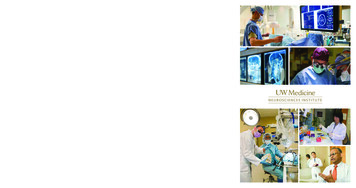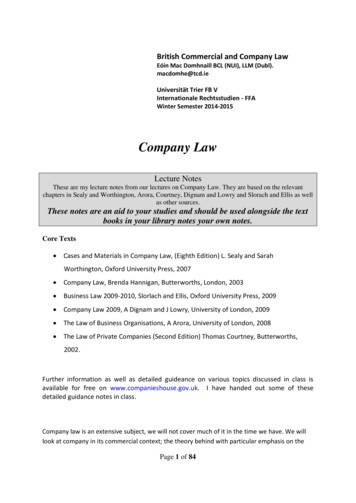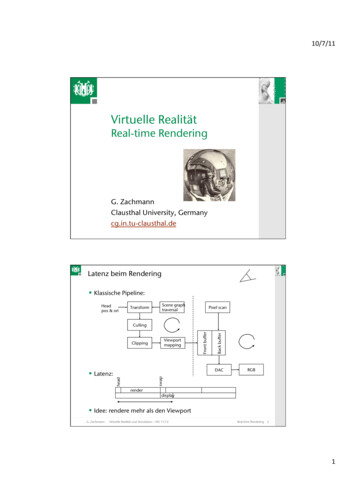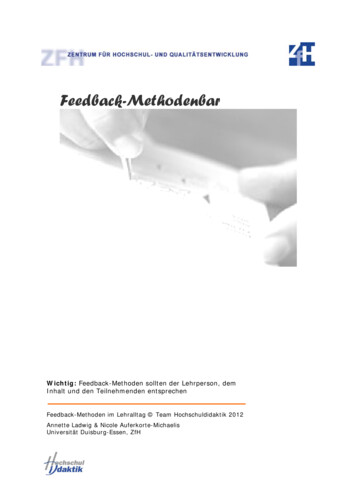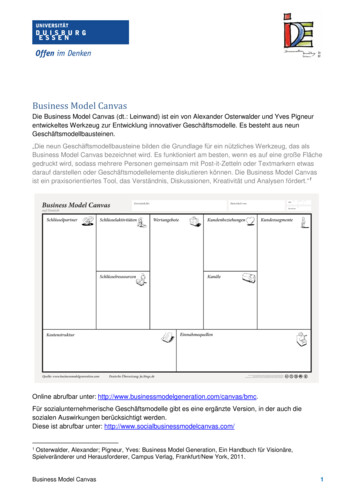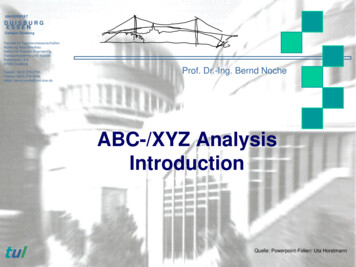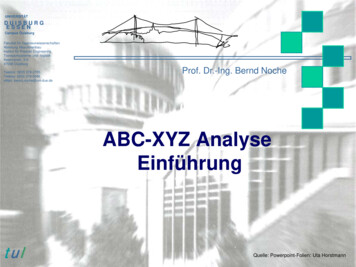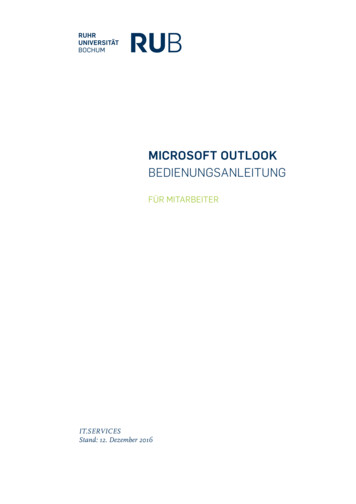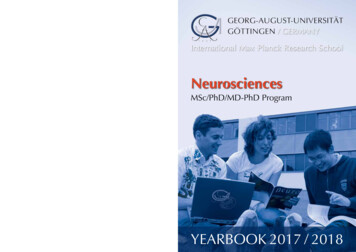
Transcription
Georg-August-UniversitätGöttingenInternational Max Planck Research SchoolNeurosciencesMax Planck Institutes for Biophysical Chemistry Experimental Medicine Dynamics and SelfOrganizationMSc/PhD/MD-PhD ProgramDPZGermanPrimate CenterGottingenEuropeanNeuroscience ARBOOK 2017 / 2018
Yearbook 2017/2018MSc/PhD/MD-PhDNeuroscience Programat the University of GöttingenInternational Max PlanckResearch School
Index / ImprintLetter from the University . 1Letter from the Max Planck Society . 2Overview . 3Intensive Course Program (First Year) . 4Lectures and Tutorials . 4Methods Courses . 5Laboratory Rotations . 5Seminars . 6Examinations . 6PhD Program . 6Master’s Program . 7Orientation, Language Courses, Social Activities . 7Application, Selection, and Admission 2017 . 7Students 2017/2018 . 8Faculty (Senior Faculty, Group Leaders, Lecturers) . 18Graduate Program Committee . 68Program Coordination . 68Imprint . 692
Letter from the PresidentSuccess for a comprehensive research university such as our Georg-AugustUniversity of Göttingen is rooted in excellent science and its integration into anoptimal learning environment to educate competent and critical young academics. I am very glad that our university in cooperation with the local Max-PlanckInstitutes and the German Primate Center has been able to establish conditions,which make top interdisciplinary science possible in an international setting enabling us all to feel the Göttingen Spirit.The two international MSc/PhD programs in Neurosciences and Molecular Biology truly have contributed to our continued strive for excellence in scienceoriented training both by integrating faculty members from university and nonuniversity institutes across institutional borders and by providing comprehensiveservices especially for international students on the Göttingen Research Campus. Based on the proven concepts and the experience of these programs theGöttingen Graduate School for Neurosciences, Biophysics and Molecular Biosciences (GGNB) was established, which is continuously supported by the federal Excellence Initiative since 2007.The Neuroscience and Molecular Biology programs remain unique within theGraduate School GGNB in offering integrated MSc/PhD curricula with a fasttrack option which allow excellent BSc graduates to directly enter the PhD phaseafter successfully absolving the initial 1st year training phase. For over a decadethese international programs have been particularly successful in attracting highnumbers of worldwide applicants of good academic quality providing the basisfor the selection of the very best candidates. New ideas introduced by these programs have meanwhile been adopted by the Georg-August University Schoolof Science (GAUSS) and other graduate schools for the benefit of the entireuniversity.While maintaining their successful structure the content and focus of the trainingcurriculum of the programs has continuously been adapted to the changing research topics. Consequently, new faculty members are integrated to reflect noveldevelopments in research. They will further ensure optimal individual supervision and up-to-date research-oriented training. Beyond academia bothprograms keep close contact with the relevant industries to enhance the opportunities of the graduates for a successful professional career in the privatesector.I would very much like to thank all colleagues and institutions for their committed support of these international programs and, last but not least, the GermanAcademic Exchange Service (DAAD), the Lower Saxony Ministry of Scienceand Culture, and the various generous donors. The Georg-August Universityof Göttingen will continue to support these programs to promote internationalexchange at all levels and for further interaction with our partners worldwide.Prof. Dr. Ulrike Beisiegel(President of the Georg August University Göttingen)1
Letter from the Max Planck SocietyThe mission of the Max Planck Society is to conduct basic research in scienceand humanities at the highest level. More than 80 Max Planck Institutes are located on scientific campuses across Germany, most of them close to universities.Scientific ties between Max Planck Institutes and universities are traditionallystrong. In 1998, during the 50th year celebration of the Max Planck Society inGöttingen, the Max Planck Society, together with the Hochschulrektorenkonferenz, launched the International Max Planck Research Schools as a new jointprogram to further intensify cooperation.The goals of the International Max Planck Research Schools are-to attract excellent students from all around the world to intensive Ph.D.training programs in Germany, preparing them for careers in science,-to integrate Max Planck scientists in top-level scientific training of juniorscientists,-to intensify the ties to the universities owing to the participationof internationally renowned Max Planck scientists in joint teaching activities,and-to strengthen international relationships by providing individual support toeach student and by exposing foreign students to German culture and theGerman language.By now, 66 International Max Planck Research Schools have been establishedinvolving 72 Max Planck Institutes, 35 German universities and 26 universitiesabroad. About 3,200 PhD students from 120 countries are presently enrolled.Since their foundation in the year 2000, the Göttingen International Max PlanckResearch Schools in Neurosciences and Molecular Biology have met with extraordinary success. Every year, the programs receive hundreds of applications,with the quality of the students consistently being very high. Most students graduated so far have moved on to postdoctoral positions, many at prestigious international institutions. In the past years, the Göttingen Schools received unanimous acclaim during external evaluations and won national awards. For instancethey are the only Life Science Programs within Germany that were selected forthe “Top Ten International Master’s Degree Courses 2006”. The Schools havealso re-shaped the local scientific community, strengthening the ties betweenthe participating institutions, and initiated new scientific collaborations that augment the international reputation of Göttingen as a center of scientific excellence. Furthermore, the Schools served as role models and founding membersof the Göttingen Graduate School for Neurosciences, Biophysics, and MolecularBiosciences, thus being instrumental for the continued support by the GermanExcellence Initiative provided to the university. We hope that in the years to comethe students of the International Max Planck Research Schools will be successful in their professional careers. We also hope that they will remember their training period in Göttingen as an exciting and stimulating phase in their lives.Martin StratmannPresidentMax Planck SocietyNils BroseDean of the IMPRSNeurosciences2
OverviewThis yearbook is intended to provide information on the International MSc/PhD/MD-PhD Program for Neurosciencesin Göttingen, Germany, which was established in 2000. In addition to general information on the program, the yearbook introduces the current year’s students, the faculty members, the program committee, and the coordination team.The program is a member of the Göttingen Graduate School for Neurosciences, Biophysics, and Molecular Biosciences (GGNB), which is funded by the Excellence Initiative of the German Federal and State Governments. It is offeredby the University of Göttingen, the Max Planck Institute for Biophysical Chemistry (MPIbpc), the Max Planck Institutefor Experimental Medicine (MPIem), the Max Planck Institute for Dynamics and Self-Organization (MPIds), the German Primate Center (DPZ), and the European Neuroscience Institute (ENI). Further to their active participation inthe Neuroscience Program, the above mentioned partners closely cooperate in the Cluster of Excellence and DFGResearch Center Nanoscale Microscopy and Molecular Physiology of the Brain (CNMPB), the Göttingen Center forMolecular Biosciences (GZMB), the Center for Systems Neuroscience (ZNV), in several collaborative research centers (Sonderforschungsbereiche, SFB), and in interdisciplinary doctoral programs (Graduiertenkollegs, GK).The International MSc/PhD/MD-PhD Neuroscience Program qualifies students for professional work in the neurosciences. The program is open to students from Germany and from abroad, who hold a Bachelor‘s degree (or equivalent) in the biosciences, medicine, psychology, physics, or related fields. All courses are held in English. Scholarshipsare available. The academic year starts in October and is preceded by a three week orientation program. Applicationsmay be submitted until January 15 of the year of enrollment. To ensure a high standard of individual training, thenumber of participants is limited to 20 students per year.All students initially participate in one year of intensive course work. This first segment of the program comprises lectures, tutorials, seminars, methods courses, and independent, individually supervised research projects (laboratoryrotations). The traditional German structure of academic semesters is not followed. The condensed schedule allowsstudents to accumulate 90 credits (ECTS) within one year, which would normally require three semesters.Subsequently, two separate segments are offered: PhD Program: Good to excellent results after the first year qualify for direct admission to a three-yeardoctoral project in one of the participating research groups. The Master’s thesis requirement is waived in this case.After successful defense of a doctoral thesis, the degree Doctor of Philosophy (Ph.D.) or the equivalent title Doctorrerum naturalium (Dr. rer. nat.) is conferred. Students who finished medical school can apply for an MD-Ph.D. title. MSc Program: Alternatively, students may conclude the program with a Master’s thesis, based on six months ofexperimental scientific research. The degree Master of Science (M.Sc.) is awarded upon successful completion ofthe Master’s thesis.ExaminationsEntry (B.Sc.)ThesisDefenseMaster sM.Sc.ThesisIntensive Course0,5 YProgram1YDoctoral Program (Thesis & Courses)3YPh.D. / Dr. rer. nat.or MD-Ph.D.Year012334
Intensive Course Program (First Year)Throughout the first year, current topics in the neurosciences are covered by- lectures- tutorials- methods courses- laboratory rotations- seminars- skills coursesLectures and Tutorials (Theoretical Modules)A comprehensive lecture series is organized into a sequence of 4-6 week units. The following topics are taught on anadvanced level throughout the first year (36 weeks, 4 hours per week):A.(Module M.Neuro.11) Neuroanatomy, DevelopmentB.(Module M.Neuro.12) Physiology and Basic StatisticsC.(Module M.Neuro.13) Modelling, Autonomous Nervous System, PharmacologyD.(Module M.Neuro.14) Molecular Biology, Development, NeurogeneticsE.(Module M.Neuro.15) Sensory and Motor FunctionsF.(Module M.Neuro.16) Clinical Neurosciences and Higher Brain FunctionsG.Specialization Seminars and TutorialsEach lecture is accompanied by a tutorial session, where students meet with a tutor in small groups. Tutorials involveexercises, review of lecture material, and discussion of related topics.4
Methods Courses (Practical Modules)During the first months of the Neuroscience Program, students participate in a series of methods courses to introduce them to principles and practical aspects of basic scientific techniques and the handling ofmodel organisms. The practical courses and tutorials comprise the following topics:M.Neuro.21 Histology & Cytology- comparative development of the vertebrate brain- cytology and ultrastructure of the human brain- functional neuroanatomy of sensory and motor systems- immunocytochemical techniques and single neuron recording- development and neuroanatomy of invertebrate modelsM.Neuro.22 Electrophysiology- introduction to medical statistics and programming languages- electrophysiological techniques- membrane physiology / synaptic transmission- FLIM / Ca-imaging / FCS techniques / confocal microscopy- sensory and behavioral physiologyM.Neuro. 23 Microscopy & Imaging- neuronal modelling- behavioral analysis- neuroendocrinology / neuropharmacology- protein separation techniquesM. Neuro.24 Zoo-Physiology- cell culture methods- methods in molecular biology- genetics of transgenic mouse modelsLaboratory Rotations (Practical Module M.Neuro.25)Starting in January, every student carries out three independent research projects (laboratory rotations) in participating laboratories. Each project is individually supervised and involves seven weeks of experimental work, followed byone week for data analysis and presentation. For each project, a report must be completed in the format of a scientificpublication. The laboratory rotations must cover at least two different subjects.5
SeminarsSeminars start in March. The class meets weekly for two hours to discuss two or three student presentations. Thepresentations are research reports based on work from the laboratory rotations.ExaminationsAfter the first year of intensive training, all students take one written and two oral Master’s examinations. The Master’sexaminations explore the students’ theoretical background in topics covered by lectures and tutorials. All candidatesare examined both in the field of anatomy and physiology in two separate oral exams.PhD ProgramStudents who have passed the Master’s examinations with good or excellent results qualify for direct admission to athree-year doctoral project in one of the participating research groups without being required to complete a Master’sthesis first.The PhD program emphasizes independent research on the part of the students. Doctoral students select threefaculty members as their doctoral thesis committee which closely monitors progress and advises students in their research project. Laboratory work is accompanied by seminars and lecture series, a wide variety of advanced methodscourses, training in scientific writing and oral presentation skills, courses in intercultural communication, bioethics andresearch ethics, elective courses, and participation in international conferences or workshops.At the end of the PhD training program, a doctoral thesis is submitted either in the traditional format, or as a collectionof scientific publications in internationally recognized journals along with a general introduction and a discussion ofthe results. The degree Ph.D. or, alternatively, Dr. rer. nat. will be awarded after the successful defense of the doctoralthesis. Having fullfilled all PhD degree requirements, medical students may apply for the degree of an MD-Ph.D. atthe Medical Faculty.6
Master’s ProgramAfter the first year of intensive training, students may conclude the program with a six-month thesis project, leading toa Master of Science degree. The thesis project involves experimental work under the supervision of faculty membersof the Neuroscience Program. Students have the opportunity to conduct their Master’s thesis project at an affiliatedresearch institution abroad.Orientation, Language Courses, Social ActivitiesA three-week orientation prior to the program provides assistance and advice for managing day-to-day life, includingarrangements for bank account, health insurance, residence permit, housing, and enrollment. Students have theopportunity to meet faculty members and visit laboratories of the participating institutions. In addition, the orientationprogram informs students about computing and library facilities, the city and university of Göttingen, sports facilities,and cultural events.An intensive basic language course in German is offered in cooperation with the Lektorat Deutsch als Fremdspracheto facilitate the start in Göttingen. Additional language courses and social activities accompany the program.Application, Selection, and Admission 2017Applicants must hold a Bachelor’s degree or equivalent in biology, medicine, psychology, physics, chemistry, orrelated fields. Applicants who are not native speakers of English should demonstrate adequate competence of theEnglish language by acceptable results in an internationally recognized test.In the year 2017, the coordination office received 420 applications from 72 countries.ContinentApplicationsAdmissions *Europe (total)658Germany233other West Europe / Middle Europe322East Europe103America (total)466North America213Central/South America253Africa (total)750North Africa290Central/South Africa460Asia (total)2335Near East770Central Asia / Far East156510Australia*Incl. 3 NEURASMUS students (from Albania, Cuba, Germany).7
Students 2017/2018NameHome CountryIrene norHeinsUSAHendrikHeiserGermanyInésHojas García-PlazaSpainAnna gamIndiaMelanieNuesch GermanoUruguay / ItalyAdriánPalacios ssian FederationJesseSt. AmandUSAYannanSuP.R. ChinaMariiaZeziuliaUkraine* NEURASMUS studentNeurasmus is an Erasmus Mundus Joint Master Degree program (EMJMDs) which isbased on the cooperation of 5 partner universities, comprising Université de Bordeaux/France, Vrije Universiteit Amsterdam/Netherlands, Universitätsmedizin Göttingen/Germany, Charité - Universitätsmedizi
pus. Based on the proven concepts and the experience of these programs the Göttingen Graduate School for Neurosciences, Biophysics and Molecular Bio-sciences (GGNB) was established, which is continuously supported by the fede-ral Excellence Initiative since 2007. The Neuroscience and Molecular B
